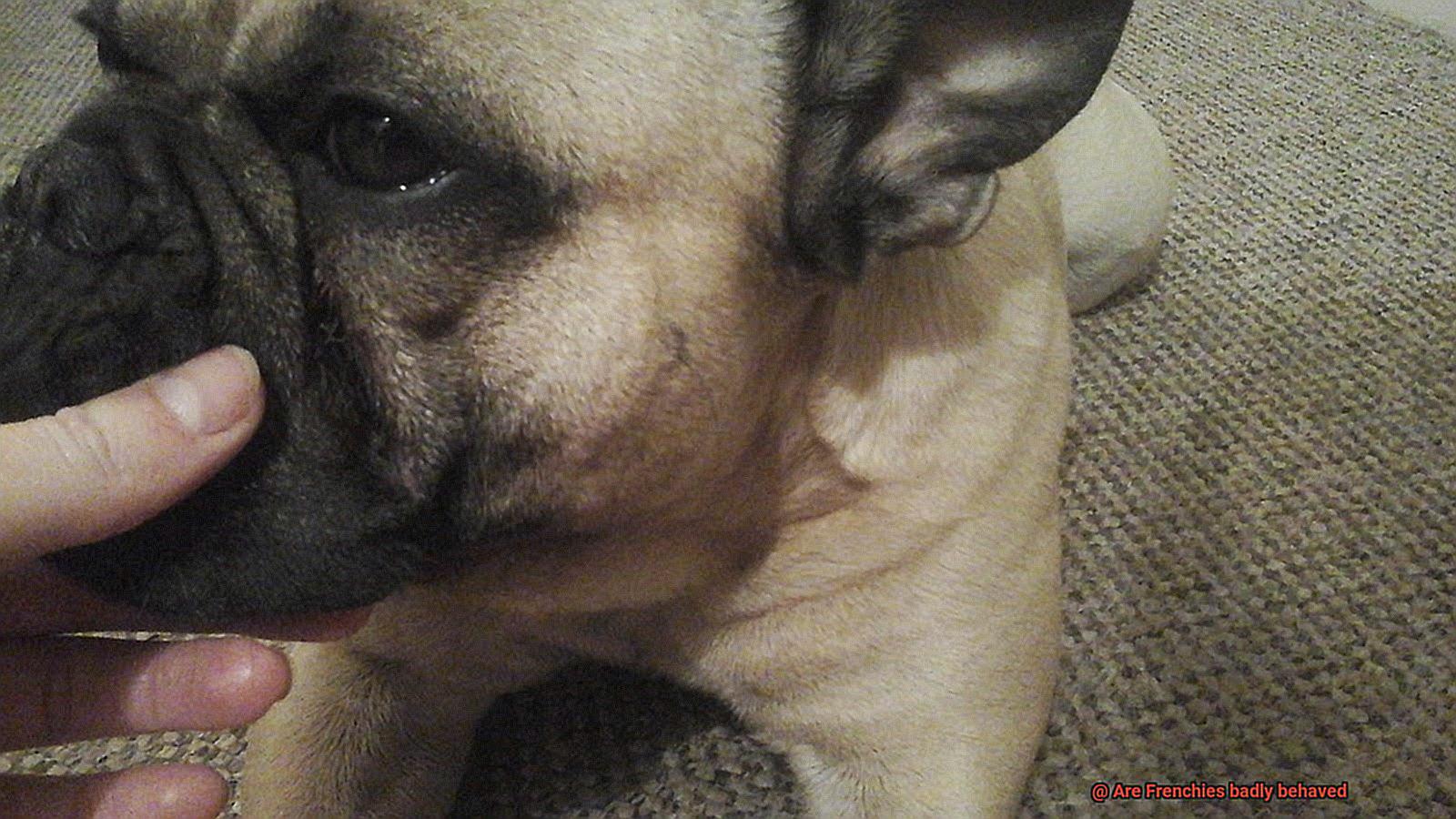Are Frenchies badly behaved?
Frenchies, those adorable little bundles of joy, have captured the hearts of dog lovers worldwide. With their playful antics and affectionate nature, it’s no wonder they’ve become such beloved companions. However, there’s a prevailing belief that Frenchies are prone to misbehavior. Today, we’re here to set the record straight and uncover the truth behind this misconception.
While it’s important to remember that every dog is unique, there are certain factors that might contribute to the perception of Frenchies as troublemakers. First and foremost, these pint-sized pups possess an iron will. Despite their small stature, French Bulldogs are known for their stubborn streaks, which can make training a tad challenging. Combine that with their boundless energy levels, and you may occasionally witness bursts of hyperactivity or restlessness.
Another aspect to consider is the Frenchie’s insatiable need for attention and affection. These dogs thrive on human interaction and can resort to attention-seeking behaviors when left alone for too long. This could manifest as barking or chewing on furniture – innocent acts that some might misconstrue as bad behavior.
Furthermore, French Bulldogs have unique physical characteristics due to being brachycephalic breeds – meaning they have a flat face and a slightly shorter airway. Unfortunately, this can lead to health issues like snoring, wheezing, or difficulty breathing in warmer climates. It’s understandable that these discomforts may affect their overall demeanor at times.
It’s crucial to acknowledge that the perception of Frenchies as ill-behaved often stems from a lack of understanding or inadequate training methods. By providing them with proper training and socialization from an early age, French Bulldogs can grow into well-mannered companions who know how to behave in any situation.

Throughout this blog series, we’ll debunk the myth surrounding Frenchies’ alleged bad behavior. We’ll delve deeper into their unique traits, discuss effective training strategies, and provide tips to address any unwanted behaviors.
French Bulldogs are truly incredible companions, showering their owners with heaps of love and loyalty. Let’s approach this topic with an open mind, ready to dispel any misconceptions. So, stay tuned for our upcoming blog posts as we unravel the intriguing question: “Are Frenchies really badly behaved?”
Common Misconceptions About Frenchies and Their Behavior
Contents
- 1 Common Misconceptions About Frenchies and Their Behavior
- 1.1 Misconception: Frenchies are stubborn and difficult to train.
- 1.2 Misconception: Frenchies are aggressive or prone to biting.
- 1.3 Misconception: Frenchies are hyperactive and full of energy.
- 1.4 Misconception: Frenchies are not good with children or other pets.
- 1.5 Misconception: Frenchies cannot tolerate heat due to their short-nosed structure.
- 1.6 Misconception: Frenchies are lazy or lack the desire for physical activity.
- 2 Potential Behavioral Issues in French Bulldogs
- 3 How to Address Stubbornness in French Bulldogs
- 4 Separation Anxiety in Frenchies: What to Do?
- 5 Aggression in French Bulldogs: Causes and Solutions
- 6 Brachycephalic Dogs: Potential Respiratory Issues and Behavioral Problems
- 7 Training Tips for French Bulldogs
- 8 The Role of Exercise in Keeping a Frenchie Well-Behaved
- 9 Conclusion
French Bulldogs, or “Frenchies,” are beloved pets known for their friendly and affectionate nature. However, there are several common misconceptions about their behavior that often lead to misunderstandings and labeling them as “badly behaved” dogs. As an expert in this field, I aim to debunk these misconceptions and provide accurate information to help French Bulldog owners better understand their pets and ensure a harmonious relationship.
Misconception: Frenchies are stubborn and difficult to train.

- While French Bulldogs can be independent at times, consistent training and positive reinforcement techniques can yield excellent results.
- Incorporate short, engaging training sessions along with rewards and praise to motivate your Frenchie.
Misconception: Frenchies are aggressive or prone to biting.
- French Bulldogs are generally friendly and sociable dogs, but individual temperament can vary.
- Proper socialization from a young age is crucial to ensure they interact well with others.

Misconception: Frenchies are hyperactive and full of energy.
- Contrary to popular belief, French Bulldogs are a calm and relaxed breed.
- While they do have bursts of energy, they also appreciate their nap time.

Misconception: Frenchies are not good with children or other pets.
Misconception: Frenchies cannot tolerate heat due to their short-nosed structure.
- While they may be more sensitive to heat, with proper precautions such as avoiding excessive exercise in hot weather, they can live comfortably in moderate climates.
Misconception: Frenchies are lazy or lack the desire for physical activity.
- While they don’t require intense exercise, daily walks and playtime are essential for mental stimulation and physical fitness.
Potential Behavioral Issues in French Bulldogs
French Bulldogs, or “Frenchies,” are often unfairly labeled as badly behaved dogs due to common misconceptions about their behavior. As an expert in this field, I aim to debunk these myths and shed light on the truth – these beloved pets are friendly, affectionate, and can be easily trained with consistent effort and positive reinforcement techniques.
In this blog post, we will delve into potential behavioral issues that French Bulldog owners may encounter, providing practical tips and strategies to address them effectively.
Separation Anxiety:
French Bulldogs form strong bonds with their owners and can become distressed when left alone for extended periods. To prevent or manage separation anxiety, try the following:
- Gradually acclimate your Frenchie to being alone through positive reinforcement training.
- Provide engaging toys or activities to keep them occupied while you’re away.
- Consider using calming aids such as pheromone diffusers or anxiety wraps.

Aggression:

While French Bulldogs are generally friendly, some individuals may display aggression towards other dogs or humans. Here’s how to address this issue:
- Socialize your Frenchie from an early age, exposing them to various people, animals, and environments.
- Seek professional help from a dog trainer or behaviorist if aggressive tendencies persist.
- Utilize positive reinforcement techniques and reward good behavior consistently.
Stubbornness:

French Bulldogs can be quite stubborn due to their independent nature. Overcome this challenge with the following strategies:
- Establish clear boundaries and rules from the start.
- Use positive reinforcement techniques such as treats and praise to motivate and reward desired behaviors.
- Be patient and consistent during training sessions.

Excessive Barking:
French Bulldogs are known for their vocalizations. Reduce excessive barking by:
- Providing mental stimulation through puzzle toys or interactive games.
- Teaching alternative behaviors such as “quiet” commands.
- Address any underlying issues such as boredom or anxiety.
How to Address Stubbornness in French Bulldogs
French Bulldogs are renowned for their charming personalities, but they can also be quite stubborn. If you’re a proud owner of a Frenchie who sometimes tests your patience, fear not. With the right approach and training techniques, you can address their stubbornness effectively. In this guide, we’ll explore some paw-some tips to help you tackle stubbornness in your French Bulldog.
Establish Yourself as the Pack Leader:
French Bulldogs are pack animals at heart, and they respond well to clear leadership. Show your Frenchie that you’re the alpha dog by setting rules and boundaries right from the start. Be consistent in your expectations and establish a daily routine that includes regular feeding times, exercise, and training sessions.
Positive Reinforcement is Key:
Rewarding good behavior is a powerful tool in training your Frenchie. Use treats, praise, and playtime to motivate them when they follow commands or display desired behavior. Remember to be generous with rewards initially and gradually reduce them as your Frenchie becomes more obedient.
Patience, Patience, Patience:

Stubbornness won’t disappear overnight, so it’s essential to be patient. Consistency is key. Keep calm and composed during training sessions, providing clear instructions and rewards when your Frenchie complies. With time and repetition, their stubbornness will gradually fade away.
Gentle Training Methods:
Avoid harsh punishments or yelling as these can create fear and resentment in your Frenchie. Instead, use firm yet gentle training methods. For example, if your Frenchie refuses to come when called, try using their favorite toy or treat as a lure to encourage them to follow the command.

Mental Stimulation Matters:
French Bulldogs are intelligent dogs that need mental challenges to stay engaged and focused. Incorporate puzzle toys, interactive games, and obedience training into their routine to channel their energy and reduce stubborn behavior. A mentally stimulated Frenchie is a happy Frenchie.
Seek Professional Help if Needed:
If your Frenchie’s stubbornness persists despite your efforts, don’t hesitate to seek professional help. A dog trainer or behaviorist who specializes in French Bulldogs can provide valuable guidance tailored to your furry friend’s needs.
Separation Anxiety in Frenchies: What to Do?
French Bulldogs are known for their lovable and affectionate nature, but they can also suffer from separation anxiety. This condition can cause distress and unwanted behaviors when left alone. In this article, we will explore effective strategies to help manage separation anxiety in Frenchies, ensuring their well-being and promoting a peaceful household.

Recognizing the Signs of Separation Anxiety:
Separation anxiety in French Bulldogs can manifest through excessive barking, destructive chewing, urinating or defecating indoors, and even self-harm. It’s important to understand that these behaviors are not indicative of a misbehaved dog, but rather a response to extreme stress and anxiety.
Gradual Acclimation:
To alleviate separation anxiety, gradually acclimate your Frenchie to being alone. Start with short absences, gradually increasing the time apart. This helps them build confidence and reduces their anxiety levels.
Mental Stimulation and Exercise:
Before leaving the house, engage your Frenchie in mental and physical stimulation. Play interactive games or use puzzle toys to tire them out. A tired Frenchie is more likely to relax and feel content when left alone.
Seeking Professional Help:
In severe cases of separation anxiety, consult a certified dog trainer or behaviorist. They can provide personalized guidance and behavior modification techniques tailored to your Frenchie’s needs. Medication may also be prescribed to manage extreme anxiety symptoms.
Creating a Safe Environment:
Ensure your Frenchie has a designated space with comfortable bedding and familiar scents while you’re away. Leave interactive toys or treat-dispensing devices to keep them occupied. Playing calming music or leaving an item with your scent can provide additional comfort.
Positive Reinforcement:
Avoid punishing or scolding your Frenchie for anxious behavior when left alone, as it can exacerbate their anxiety. Instead, use positive reinforcement techniques to reward calm behavior. This helps them associate being alone with positive experiences.
Aggression in French Bulldogs: Causes and Solutions
French Bulldogs are known for their friendly and affectionate nature, but like any other breed, they can sometimes display aggressive behavior. Understanding the potential causes of aggression in French Bulldogs is crucial in effectively managing their behavior and ensuring a safe and harmonious living environment for both the dog and its owners.
Causes of Aggression in French Bulldogs
- Genetics: Some French Bulldogs may have a genetic predisposition towards aggression due to their breeding lines. It is essential to research and choose a reputable breeder who prioritizes temperament when selecting breeding pairs.
- Improper Socialization: Lack of proper socialization during the crucial developmental stage can contribute to aggression in French Bulldogs. Exposing them to various people, animals, and environments from a young age helps them become well-adjusted and confident.
- Fear or Anxiety: French Bulldogs may display aggression as a response to fear or anxiety-inducing situations. Identifying and addressing the underlying cause of their fear or anxiety is crucial in managing their aggressive behavior.
- Possessiveness: French Bulldogs can become possessive over food, toys, or their personal space, leading to aggression towards anyone who tries to approach or take away their belongings. Training them with positive reinforcement techniques and teaching them appropriate boundaries can help prevent possessiveness-related aggression.
- Territoriality: French Bulldogs are known to be protective of their family and territory. They may exhibit aggression towards unfamiliar people or animals as a means of guarding what they perceive as theirs. Proper training and socialization from an early age can help curb territorial aggression.
- Medical Issues: Sometimes, aggression in French Bulldogs can be linked to certain medical conditions such as pain, hormonal imbalances, or neurological disorders. It is essential to rule out any underlying health issues by consulting with a veterinarian before addressing the behavioral aspect.

Solutions for Aggression in French Bulldogs
- Early socialization: Start socializing your French Bulldog from a young age, exposing them to various experiences, people, and animals. This helps them become well-rounded and less prone to aggression.
- Positive reinforcement training: Use positive reinforcement techniques such as treats, praise, and rewards to train your French Bulldog. Focus on reinforcing good behavior rather than punishing or scolding aggressive behavior.
- Consistency and structure: Establish a consistent routine and clear rules for your French Bulldog. They thrive in an environment with structure and clear expectations.
- Seek professional help: If your French Bulldog’s aggression persists or escalates despite your efforts, it may be beneficial to seek the assistance of a professional dog trainer or behaviorist who specializes in aggression in dogs.
- Medical evaluation: If you suspect that your French Bulldog’s aggression may be due to underlying medical issues, consult with a veterinarian to rule out any health conditions that may be contributing to their behavior.
Brachycephalic Dogs: Potential Respiratory Issues and Behavioral Problems
French Bulldogs are adored for their cute and distinctive appearance, with their flat faces and shortened skulls. However, these unique features can result in potential respiratory issues and behavioral problems that owners should be aware of. In this article, we will explore the common respiratory issues faced by brachycephalic dogs like French Bulldogs, as well as the behavioral challenges they may encounter.
Respiratory Issues in Brachycephalic Dogs
Brachycephalic airway syndrome is a condition that affects many brachycephalic dog breeds, including French Bulldogs. This syndrome is caused by the narrowed airways resulting from their short muzzles and compacted facial structure. As a result, these dogs may experience difficulties breathing properly.
Symptoms of brachycephalic airway syndrome include snoring, wheezing, and difficulty exercising. These respiratory issues can be further exacerbated in hot and humid weather. It’s essential for owners to be mindful of these symptoms and seek veterinary care if they notice any signs of respiratory distress.
Behavioral Problems in Brachycephalic Dogs
The respiratory issues faced by brachycephalic dogs can also lead to behavioral problems. Due to their difficulty in breathing, these dogs may become anxious or aggressive in certain situations. They may also have a lower tolerance for physical exertion and exercise, leading to a more sedentary lifestyle and potential weight gain.
Managing these behavioral problems requires proper training and socialization. Positive reinforcement methods should be used to encourage desired behaviors and reduce anxiety or aggression. Seeking professional help from a dog trainer or behaviorist can provide valuable guidance in addressing these challenges.
Tips for Owners
As an owner of a French Bulldog or any other brachycephalic breed, it’s crucial to understand their unique needs and challenges. Here are some tips to help you care for your furry friend:
- Provide a cool and well-ventilated environment: Brachycephalic dogs are more susceptible to heat exhaustion, so it’s important to keep them in a cool and well-ventilated space, especially during hot weather.
- Avoid strenuous activities: These dogs may have difficulty exercising due to their respiratory issues. It’s important to avoid activities that can exacerbate their breathing difficulties and opt for low-impact exercises instead.
- Regular veterinary check-ups: Regular check-ups with your veterinarian are crucial to monitor your dog’s respiratory health and address any concerns early on.
- Early socialization and training: Proper socialization and training from an early age can help minimize behavioral problems. Positive reinforcement techniques should be used to reinforce good behavior and reduce anxiety or aggression.
Training Tips for French Bulldogs
Frenchies are known for their friendly and affectionate nature, but like any breed, they can benefit from proper training. In this article, we’ll explore effective training tips specifically tailored for French Bulldogs. By starting early, being consistent, using positive reinforcement, socializing, and practicing patience, you can ensure your Frenchie grows up to be a well-behaved and obedient companion.
Start Early:
French Bulldogs are like sponges when they’re young. Begin training your Frenchie as early as possible, around 8-10 weeks of age. This is when they’re most receptive to learning and adapting to new experiences. Starting early helps establish good habits and prevents unwanted behaviors from developing.
Consistency is Key:
Frenchies love routine and predictability. Establish clear rules and boundaries from the beginning and make sure everyone in the family is on the same page. Consistency in commands, rewards, and consequences will help your Frenchie understand what’s expected of them and reinforce positive behavior.
Positive Reinforcement:
French Bulldogs respond well to praise, treats, and rewards. Use small, tasty treats during training sessions and reward your Frenchie immediately after they perform a desired behavior. This positive association encourages them to repeat the behavior in the future. Avoid harsh punishments or scolding as it can have a negative impact on their overall demeanor.
Socialization:
Expose your Frenchie to different people, animals, environments, and situations from an early age. Take them on walks, introduce them to friendly dogs, and allow them to interact with different individuals. This promotes positive socialization and helps them develop confidence while preventing fear-based aggression or shyness.
Patience and Persistence:
Training takes time and effort. French Bulldogs may not learn commands as quickly as some other breeds, but with consistent training sessions and positive reinforcement, they’ll eventually catch on. Keep training sessions short and fun to prevent boredom and loss of interest.
The Role of Exercise in Keeping a Frenchie Well-Behaved
As a proud owner of a French Bulldog, you know that these little bundles of joy are full of energy and love to keep you on your toes. But did you know that regular exercise plays a vital role in keeping your Frenchie well-behaved? Let’s dive into the importance of exercise and how it can help maintain your Frenchie’s good behavior.
- Burning off Excess Energy: Just like humans, Frenchies need an outlet for their energy. Lack of exercise can lead to behavioral problems such as excessive barking, chewing, digging, and hyperactivity. Regular exercise helps burn off that excess energy, preventing destructive behaviors and promoting calmness in your Frenchie.
- Tailoring the Exercise Routine: It’s important to tailor the exercise routine according to your Frenchie’s age, health condition, and individual needs. Young Frenchies may require more exercise to release their energy, while older ones may need shorter and less intense activities. Find the right balance that suits your Frenchie’s needs.
- A Tired Frenchie is a Well-Behaved Frenchie: We all know the saying, “A tired dog is a happy dog.” Well, the same goes for Frenchies. Regular exercise helps reduce anxiety, boredom, and restlessness in your Frenchie. A tired Frenchie is more likely to be well-behaved and content.
- Mental Stimulation: Exercise should not just be physical but also provide mental stimulation for your Frenchie. Incorporate interactive games and training sessions into your exercise routine to keep their minds sharp and engaged. This will prevent boredom and promote good behavior.
- Socialization Opportunities: Exercise also provides an excellent opportunity for socialization with other dogs and humans. This is crucial for a well-behaved Frenchie as it helps them learn proper behavior and manners. Plus, it’s a great way to make new furry and human friends.
- Weight Management: Regular exercise plays a crucial role in maintaining a healthy weight for your Frenchie. Obesity-related issues can impact their behavior, so keeping them physically fit is essential. A healthy weight promotes overall well-being and contributes to good behavior.
Incorporating various types of exercises, such as walking, jogging, playing fetch, or participating in canine sports, will keep your Frenchie mentally stimulated and physically fit. Remember to consult with your veterinarian to ensure that the exercise routine is appropriate for your Frenchie’s specific needs.
s97x_RxLY1A” >
Conclusion
Frenchies, like any other breed of dog, can exhibit a range of behaviors. While some may argue that Frenchies are badly behaved, it is important to remember that behavior is influenced by various factors such as training, socialization, and individual temperament. It would be unfair to label an entire breed as “badly behaved” based on the actions of a few individuals.
Instead of focusing solely on negative behavior, it is more productive to understand the reasons behind certain actions and address them accordingly. Frenchies are known for their intelligence and playfulness, which can sometimes manifest as stubbornness or mischievousness. However, with consistent positive reinforcement training and proper socialization from an early age, these behaviors can be effectively managed.
It is also worth noting that every dog is unique and may have different behavioral tendencies. Some Frenchies may naturally be more energetic or prone to certain behaviors than others. This does not make them inherently badly behaved but rather highlights the importance of understanding and accommodating individual needs.
In conclusion, while Frenchies may occasionally exhibit challenging behaviors, it is unfair to generalize and categorize them as “badly behaved.”




